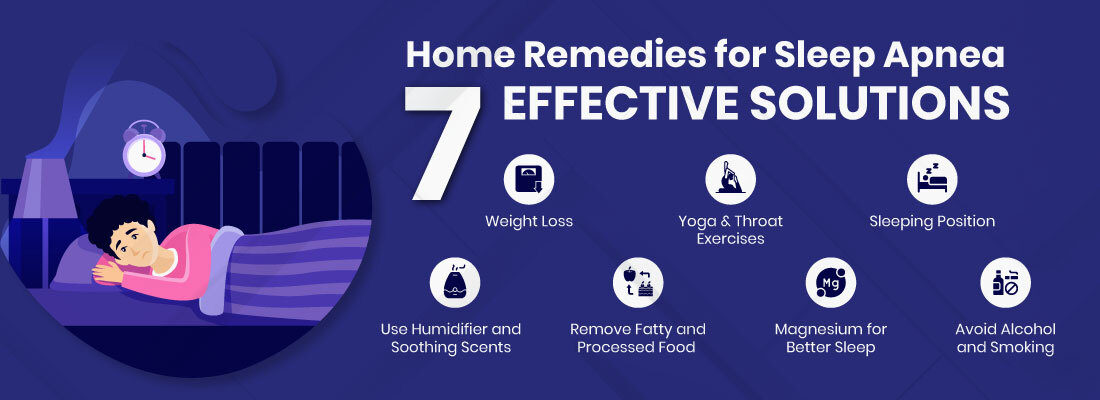
If you are one of the more than 25 million Americans who have been diagnosed with sleep apnea, you probably don’t know what to do next. You need help dealing with the sleep apnea that has been making you sleepy during the day and keeping you up at night. But where do you start?
Finding a solution to a problem while you sleep might seem overwhelming, but some home remedies for sleep apnea might be able to help you. Read the blog to find out about home and natural sleep apnea remedies.
What is Sleep Apnea?
Sleep apnea is a common sleeping disorder where your breathing pauses for a few seconds during the night, messing up your sleep rhythm. There are two main types: Obstructive Sleep Apnea (OSA), caused by partial or complete airway blockage. Central Sleep Apnea (CSA) involves a failure of the brain to signal the muscles controlling breathing.
Moreover, in North America, sleep apnea poses a significant public health concern, with a higher prevalence in males (15-30%) than in females (10-15%). These figures underscore its widespread nature and emphasize the need to learn about home remedies for sleep apnea.
Home Remedies for Sleep Apnea
Your doctor will evaluate your general health before recommending medical devices or invasive procedures. Some people with obstructive sleep apnea (OSA) can feel a lot better after using natural sleep apnea treatments. But for people with central sleep apnea (CSA), this method doesn’t work.
Lifestyle changes
Weight Loss
Firstly, one of the home remedies for sleep apnea is managing your weight. Studies discovered a direct link between sleep apnea and obesity, emphasizing that excess fat in the upper airway can hinder airflow and impair muscle function.
Addressing this connection, researchers advocate weight loss as a valuable approach to treating obstructive sleep apnea.
Maintaining a healthy weight can reduce the risk of airway obstruction and nasal passage constriction. This alleviates sleep apnea symptoms and is a natural sleep remedy. While weight loss can potentially eliminate sleep apnea, it’s crucial to note that a regain of weight may contribute to the recurrence of the condition.
Yoga & Throat Exercises
Engaging in yoga can enhance oxygen levels through its diverse breathing exercises, subsequently minimizing disruptions during sleep.
Furthermore, sleep apnea involves the relaxation of throat muscles and the obstruction of air passage by soft tissues during sleep, leading to partial or temporary blockages. To alleviate these symptoms, throat exercises, specifically oropharyngeal exercises, have been identified as a potential method to reduce the severity of sleep apnea.
Moreover, the unique contribution of yoga lies in its dual benefits – it not only strengthens the throat through targeted breathing exercises but also enhances overall body fitness through physical activity.
Meanwhile, yoga may not burn as many calories as rigorous aerobic routines, but it fosters strength and endurance. It is one of the best home remedies for sleep apnea
Sleeping Position
Changing your sleep position can significantly alleviate sleep apnea symptoms and enhance the quality of your sleep. According to a 2006 study, more than half of obstructive sleep apnea cases depended on sleeping position.
Furthermore, research indicates that sleeping on your back, known as the supine position, can exacerbate symptoms, while for some adults, sleeping on the side may contribute to breathing normally.
To address sleep apnea symptoms, it is recommended to discuss body positioning and available treatment options with your healthcare provider.
Use Humidifier and Soothing Scents
Employing a humidifier is a beneficial practice for individuals dealing with sleep apnea. Moreover, humidifiers introduce moisture into the air and play a crucial role in alleviating irritation to the respiratory system caused by dry air.
Nevertheless, contemplate adding lavender, peppermint, or eucalyptus oil to the humidifier, as these essential oils possess anti-inflammatory and soothing properties. These soothing scents are great natural sleep apnea remedies for sleep apnea.
It’s important to maintain and clean the humidifier. It can become breeding grounds for molds and bacteria, posing potential risks to respiratory health.
Remove Fatty and Processed Food
When it comes to losing weight one of the best home remedies for sleep apnea is changing diets. The Mediterranean diet, which contains more greens and less processed food, brings loads of benefits. In a study, researchers found that following a Mediterranean diet, using a CPAP machine, and engaging in exercise improved sleep for people with sleep apnea.
The Mediterranean diet emphasizes fruits, vegetables, whole grains, nuts, seeds, and olive oil while minimizing red meat and processed foods.
Use olive oil for cooking and picking fish or chicken over red meat. The best is to choose leafy greens instead of potatoes or fries.
Additionally, snacking on fresh fruit, nuts, or seeds instead of chips or crackers is a much healthier alternative.
Magnesium for Better Sleep
A study show that individuals with sleep apnea exhibited lower levels of magnesium in their bodies, and this deficiency correlated with higher c-reactive protein levels in the bloodstream. C-reactive proteins, produced by the liver, play a role in combating inflammation.
Sleep apnea sufferers often undergo elevated oxidative stress during the night. Magnesium, known for its potent anti-inflammatory properties, has the potential to reduce inflammation and may offer therapeutic benefits for those dealing with sleep apnea.
Trying home remedies for sleep apnea includes eating food rich in magnesium including avocados, seeds, nuts, bananas, and leafy greens like kale, spinach, and collard greens. Even dark chocolate is a good magnesium source. While magnesium supplements are an option, it’s crucial to consult a doctor before taking any.
Avoid Alcohol and Smoking
Making lifestyle changes such as quitting smoking and moderating alcohol intake can have a positive impact on sleep apnea. Both alcohol and tobacco use can lead to throat muscle relaxation and airway inflammation, worsening snoring and sleep interruptions.
Oxygen Therapy
If the things you try at home to treat sleep apnea don’t work, oxygen therapy might help. Sleep apnea makes it hard for air to get to all parts of your body, which is one of its biggest problems. This is a direct effect of the trouble breathing that people with sleep apnea have. The use of oxygen therapy while sleeping can help some people.
Oxygen therapy might be a good choice if you have trouble controlling your breathing when using natural sleep apnea therapies. Studies have also shown that people with sleep apnea who use oxygen treatment while they sleep have higher oxygen saturation.
Machines Therapy
CPAP & BiPAP
Most likely, if you know of sleep apnea, you have heard about continuous positive airway pressure (CPAP) devices. Positive pressure is how CPAP machines maintain your airway open while you sleep. Though CPAP is very successful, only around two-thirds of patients with sleep apnea follow the recommended usage guidelines.
A BiPAP, or bilevel positive airway pressure machine, may be helpful for some individuals who do not use their CPAP. BiPAP machines are easier to adjust to because you may control the pressure level for both breathing and exhaling.
Additionally, some aspects of the most recent CPAP devices allow for comparable adjustments—though not to the same level as a BiPAP machine.
Both devices use positive pressure to maintain an open airway, but CPAP is the standard positive airway pressure treatment for people with sleep apnea. BiPAP is often only prescribed to individuals unable to tolerate using a CPAP at night or whose home treatments for sleep apnea do not work.
Oral appliance
Treatment for mild OSA patients with an oral appliance is less usual. There are several choices available:
Mandibular advancement devices help you maintain an open airway by pushing your jaw forward. Custom devices can be made for patients by dentists who have earned certification from the American Academy of Sleep Medicine.
By keeping your tongue in your throat, tongue retention devices keep your airway open during sleep.
Like a mandibular advancement device, mouth guards fit your jaw with less adjustment. You can get them directly from an online specialist for a lower cost.
For patients with severe OSA, oral appliances are typically not advised unless all other options have been exhausted. Oral appliances are not able to treat CSA in its sufferers.
When a person has sleep apnea, many insurance companies will pay for their dental appliances. Verify your benefits to find out what is affordable.
Surgical Intervention
If home remedies for sleep apnea or other therapies do not work. Then you opt for the most invasive treatment option for sleep apnea, which is surgery. Depending on the type of surgery you chose with your doctor, you may need to have your sleep apnea treated by either an oral and maxillofacial surgeon or an ENT surgeon.
Surgical interventions for sleep apnea include uvulopalatopharyngoplasty, which involves the removal of tissues from the mouth and throat along with tonsils and adenoids. While this surgery may be effective in curbing snoring caused by throat vibrations, it is deemed less reliable than CPAP and not considered a primary treatment for obstructive sleep apnea.
Furthermore, radiofrequency ablation is a treatment option for individuals unable to tolerate CPAP or oral appliances. This treatment involves using radiofrequency energy to remove or shrink tissues in the throat.
Additionally, nerve stimulation requires surgery to insert a stimulator for the hypoglossal nerve controlling tongue movement. It aims to maintain an open airway through increased tongue position control, necessitating additional research for conclusive evidence.
Consult your doctor to determine which surgical option is ideal for you if you’re thinking about having surgery to address your sleep apnea.
Conclusion
In conclusion, it’s advisable to explore home remedies for sleep apnea before considering machine-based interventions. These may offer a more comfortable sleep experience initially. However, if symptoms persist or worsen, consulting with a doctor is still recommended for a comprehensive evaluation and appropriate guidance.
Choosing a treatment plan and receiving a sleep apnea diagnosis are easy processes with Home Sleep Centre. Our physicians can assess your symptoms, prescribe a home sleep test, and make a diagnosis of sleep apnea all from a distance. The diagnosis procedure doesn’t require you to visit a doctor’s office.
We facilitate the process of getting therapy for sleep apnea following a diagnosis. You can select from a variety of CPAP machines and accessories that we offer.
If you don’t feel comfortable using CPAP, we also offer Phillips NightBalance. When you wear it to bed, it will vibrate to remind you to sleep on your side rather than back to reduce the symptoms of sleep apnea.
Everyone deserves a good night’s rest.

